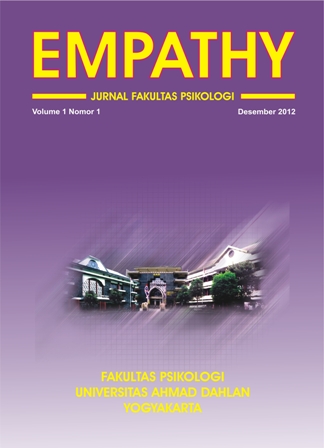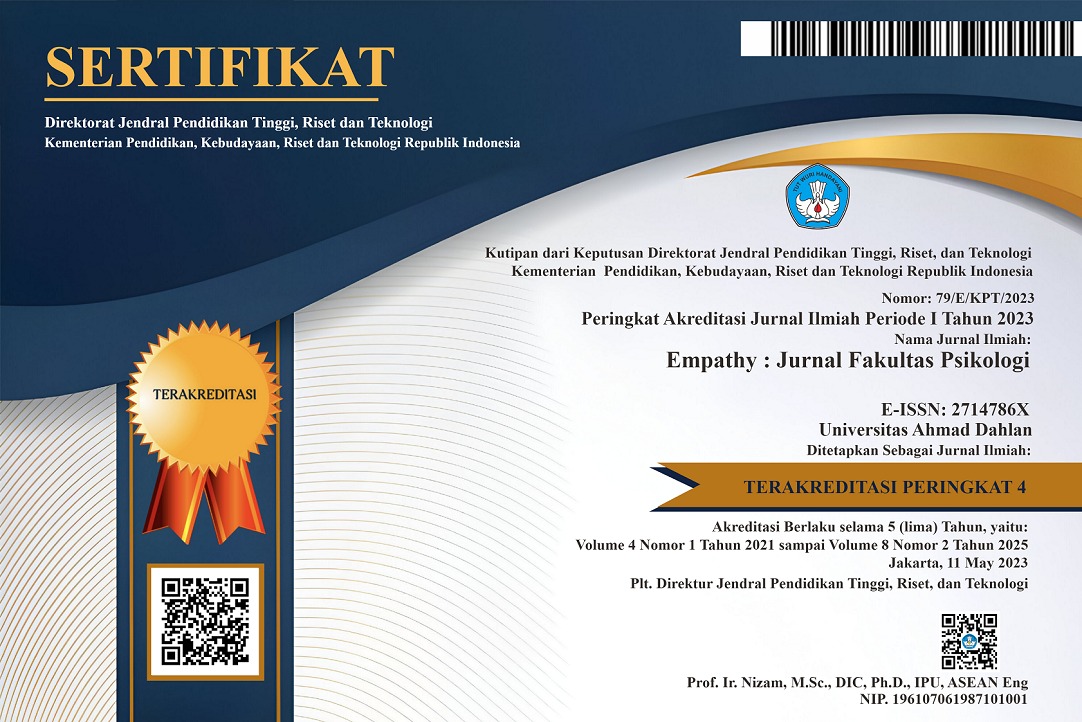Perceived organizational support and gratitude towards employee organizational commitment
DOI:
https://doi.org/10.12928/empathy.v7i1.27311Keywords:
Gratitude, organizational commitment, perceived organizational supportAbstract
This study aims to examine the influence of perceived organizational support (POS) and gratitude on the organizational commitment of employees at RSUD dr M.Y. The sampling technique used was quota sampling, with 103 employees participating as subjects in the study. The instruments utilized included organizational commitment scale, perceived organizational support scale, and gratitude scale. Data analysis employed multiple linear regression. The results indicate a significant influence of both perceived organizational support and gratitude on organizational commitment at RSUD dr M.Y. Specifically, perceived organizational support does not significantly affect organizational commitment, whereas gratitude has a highly significant impact on organizational commitment. The conclusion drawn from this research is that higher levels of POS and gratitude jointly correspond to higher organizational commitment, and vice versa. However, independently, high or low levels of POS do not influence organizational commitment. Furthermore, higher levels of gratitude correlate with increased organizational commitment, while lower levels of gratitude correlate with decreased organizational commitment.
References
Afsar, B., & Badir, Y. (2017). Workplace spirituality, perceived organizational support and innovative work behavior: the mediating effects of person-organization fit. Journal of Workplace Learning, 29, 95-109. https://doi.org/10.1108/JWL-11-2015-0086
Allen, M. W., & Brady, R. M. (1997). Total quality management, organizational commitment, perceived commitment, perceived organizational support, and intraorganizational communication. Management Communication Quarterly,10(3), 316-341. https://doi.org/10.1177/089331899701000300
Amalia, J. (2020). Pengaruh perceived organizational support terhadap komitmen organisasi. Jurnal manajemen pendidikan dan pelatihan, 4(2), 131-142. https://doi.org/10.35446/diklatreview.v4i2.511
Armstrong, M., & Brown, D. (2006). Strategic reward: making it happen. United Kingdom: Kogan Page Publishers.
Aulia, V. (2021). Pengaruh kompetensi dan komitmen organisasi terhadap kinerja karyawan PT. Hamatek Indo Bekasi. Jurnal Inovatif Mahasiswa Manajemen, 1(2), 158-168.
Aulia, A., Sutanto, A., & Hidayat, A. C. (2019). Determinants of work engagement for TNI-AD (Indonesian Armed Forces-Army) personnel [determinan keterikatan kerja personel Tentara Nasional Indonesia-Angkatan Darat (TNI-AD)]. ANIMA Indonesian Psychological Journal, 35(1), 35-55. https://doi.org/10.24123/aipj.v35i1.2881
Azwar, S. (2012). Penyusunan skala. Yogyakarta: Pustaka Pelajar.
Aube, C., Rousseau, V., & Morin, E. M. (2007). Perceived organizational support and organizational commitment: The moderating effect of locus of control and work autonomy. Journal of managerial Psychology, 22(5). DOI 10.1108/02683940710757209
Bakker, A. B., & Leiter, M. P. (2010). Work engagement: introduction. Work engagement: A handbook of essential theory and research. New York: Psychology Press
Cahayu, N. M. A., & Rahyuda, A. G. (2019). Pengaruh perceived organizational support terhadap komitmen organisasional dengan kepuasan kerja sebagai variabel mediasi. E-Jurnal manajemen, 8(10), 6042-6058. https://doi.org/10.24843/EJMUNUD.2019.v08.i10.p09
Coyle, J., Saphiro, Shore, L., Taylor, S., & Tetrick, L. (2004). The employement relationship: Examining Psychological and contextual perspectives. Oxford : Oxford University Press.
Demerouti, E., & Bakker, A. B. (2008). The Oldenburg Burnout Inventory: A good alternative to measure burnout and engagement. Handbook of stress and burnout in health care, 65(7). https://www.isonderhouden.nl/doc/pdf/arnoldbakker/articles/articles_arnold_bakker_173.pdf
Eisenberger, R., Huntington, R., Hutchison, S., & Sowa, D. (1986). Perceived organizational support. Journal of Applied psychology, 71(3). https://psycnet.apa.org/doi/10.1037/0021- 9010.71.3.500
Emmons, R. A., & McCullough, M. E. (Eds.). (2004). The psychology of gratitude. Oxford University Press.
Emmons, R. A. (2007). Thanks!: How the new science of gratitude can make you happier. Houghton Mifflin Harcourt.
Emmons, R. A., & Stern, R. (2013). “Gratitude as a psychotherapeutic intervention”. Journal of Clinical Psychology, 68(8), 846-855. https://doi.org/10.1002/jclp.22020
Fatdina. (2015). Peran dukungan organisasi yang dirasakan karyawan sebagai mediator pengaruh keadilan prosedural terhadap perilaku kewarganegaraan organisasi. Jurnal Psikologi, 36(1), 1-17. 10.22146/jpsi.7901
Kamalia, L., & Eryani, R. D. (2018). Kontribusi gratitude terhadap komitmen organisasi pada guru pembimbing khusus di SDN X Bandung. Prosiding Psikologi, 4(2), 768-772. http://dx.doi.org/10.29313/.v0i0.11476.
Kurtesssis, J. N., Eisenberger, R., Ford, M. T., Buffardi, L. C., Stewart, K. A., …Adis, C. S. (2015). Perceived organizational support: a meta-analytic evaluation of organizational support theory. Journal of management, XX (X), 1-31. DOI: 10.1177/0149206315575554.
Listiyandini, R. A., Nathania, A., Syahniar, D., Sonia, L., & Nadya, R. (2015). Mengukur rasa syukur: pengembangan model awal skala bersyukur versi Indonesia. Jurnal Psikologi Ulayat, 2(2), 473-496. 10.24854/jpu22015-41
Lubis, F. (2022). Kontribusi perceived organizational support terhadap komitmen organisasi pada anggota kepolisian Republik Indonesia. Syntax Literate; Jurnal Ilmiah Indonesia, 7(2), 2037-2044. https://www.jurnal.syntaxliterate.co.id/index.php/syntax-literate/article/view/6362/3648
Ma'rufi, A. R., & Anam, C. (2019). Faktor yang memengaruhi komitmen organisasi. Prosiding Seminar Nasional Magister Psikologi Universitas Ahmad Dahlan. 442-446. http://www.seminar.uad.ac.id/index.php/snmpuad/article/view/3458/788
McCullough, M. E., Emmons, R. A., & Tsang, J. A. (2002). The grateful disposition: a conceptual and empirical topography. Journal of personality and social psychology, 82(1), 112-127. 10.1037//0022-3514.82.1.112
McCullough, Michael E., Emmons, Robert A. (2004). The psychology of gratitude. New York: Oxford University Press.
Meyer, J. P., & Allen, N. J. (2004). TCM employee commitment survey academic users guide 2004. London, Ontario, Canada: The University of Western Ontario, Department of Psychology.
Mowday, R. T., Steers, R. M., & Porter, L. W. (1979). The measurement of organizational commitment. Journal of vocational behavior, 14(2), 224-247. https://doi.org/10.1016/0001-8791(79)90072-1
Mowday, R. T., Porter, L. W, & Steers, R. M. (1982). Organizational and occupational psychology. California: Academic Press, Inc.
Nahita, P. (2021). Pengaruh kepuasan kerja terhadap komitmen organisasional karyawan pada organisasi kantor hukum. Journal of management and business review, 18(2), 393-405
https://doi.org/10.34149/jmbr.v18i2.296
Nguyen, H. N., Le, Q. H., Tran, Q. B., Tran, T. H. M., Nguyen, T. H. Y., …Nguyen, T. T. Q. (2020). The impact of organizational commitment on employee motivation: a study ion vietnamese enterprises. Journal Of Asian Finance, Economics an Business, 7(6), 439-447. doi:10.13106/jafeb.
Peterson, C., & Seligman, M. E. P. (2004). Character strengths and virtues: a handbook and classification. New York: Oxford University Press and Washington DC: American Psychological Association. http://www.viacharacter.org
Pratiwi, A. R., & Muzakki. (2021). Perceived organizational support terhadap komitmen organisasi dan kinerja karyawan. Jurnal Ilmiah Manajemen Dan Bisnis, 22(1), 111-120. https://doi.org/10.30596/jimb.v22i1.5282
Pratiwi, H. (2020). Pengaruh persepsi dukungan organisasi terhadap komitmen organisasi dimediasi oleh kepuasan kerja pada karyawan AJB bumiputera 1912 (Skripsi tidak diterbitkan). Fakultas Ekonomi Universitas Negeri Jakarta, Jakarta.
Radiafilsan, C. (2019). Pengaruh perceived organizational support (POS) terhadap komitmen organisasi SMA Negeri di Kota Palangka Raya. Equity In Education Journal (EEJ), 1(1), 48-55. https://doi.org/10.37304/eej.v1i1.1552
Reber, A. S. & Reber. E. S. (2010). Kamus psikologi. Yogyakarta : Pustaka Pelajar
Rhoades, L., & Eisenberger, R. (2002). Perceived organizational support: a review of the literature. Journal of applied psychology, 87(4), 698.
Robbins, S. P., & Judge T. A. (2015). Perilaku organisasi, edisi 16. Jakarta: Salemba Empat.
Salam, W. R. (2020). Komitmen organisasi, kajian: manajemen sumber daya manusia. Tangerang Selatan: Unpam Press.
Sari, E. Y. D., Bashori, K., & Purwadi. (2021). Keterikan kerja dan epran aspek psikologi positif. Yogyakarta : UAD Press.
Steers, R. M. (1977). Antecedents and outcomes of organizational commitment. Administrative science quarterly, 22, 46-56. https://doi.org/10.2307/2391745
Sultan, N. F., Lukman, R. Y., & Kartini. (2021). Pengaruh gaya kepemimpinan dan komitmen organisasi terhadap kinerja karyawan saat pandemi covid-19. AKUNSIKA: Jurnal Akuntansi dan Keuangan, 2(2), 60-67. http://dx.doi.org/10.31963/akunsika.v2i2.2731
Supiati. (2021). Pengaruh motivasi dan disiplin kerja terhadap komitmen organisasi pada PT Sorako jaya abadi motor kota Palopo. Jurnal ilmiah, manajemen sumber daya manusia, 5(3). 578-585. http://dx.doi.org/10.32493/JJSDM.v5i3.20386
Wayne, S. J., Shore, L. M., & Liden, R. C. (1997). Perceived organizational support and leader-member exchange: A social exchange perspective. Academy of Management journal, 40(1), 82-111. https://doi.org/10.5465/257021
Yusuf Q, M., Risal, M., Srisapta. (2021). The effect of leadership, motivation and job satisfaction on organizational commitment. Jurnal Office: Jurnal Pemikiran Ilmiah dan Pendidikan Administrasi Perkantoran, 7(1), 101-110. https://doi.org/10.26858/jo.v7i1.22596
Zati, M. N. (2022). Pengaruh gratitude terhadap komitmen organisasi pada guru honorer (Skripsi tidak diterbitkan). Fakultas Psikologi Universitas Sumatera Utara, Medan.
Downloads
Published
Issue
Section
License
Authors who publish with Empathy: Jurnal Fakultas Psikologi agree to the following terms:
- Authors retain copyright and grant the journal right of first publication with the work simultaneously licensed under a Creative Commons Attribution License (CC BY-SA 4.0) that allows others to share the work with an acknowledgment of the work's authorship and initial publication in this journal.
- Authors are able to enter into separate, additional contractual arrangements for the non-exclusive distribution of the journal's published version of the work (e.g., post it to an institutional repository or publish it in a book), with an acknowledgment of its initial publication in this journal.
- Authors are permitted and encouraged to post their work online (e.g., in institutional repositories or on their website) prior to and during the submission process, as it can lead to productive exchanges, as well as earlier and greater citation of published work.

This work is licensed under a Creative Commons Attribution-ShareAlike 4.0 International License.




